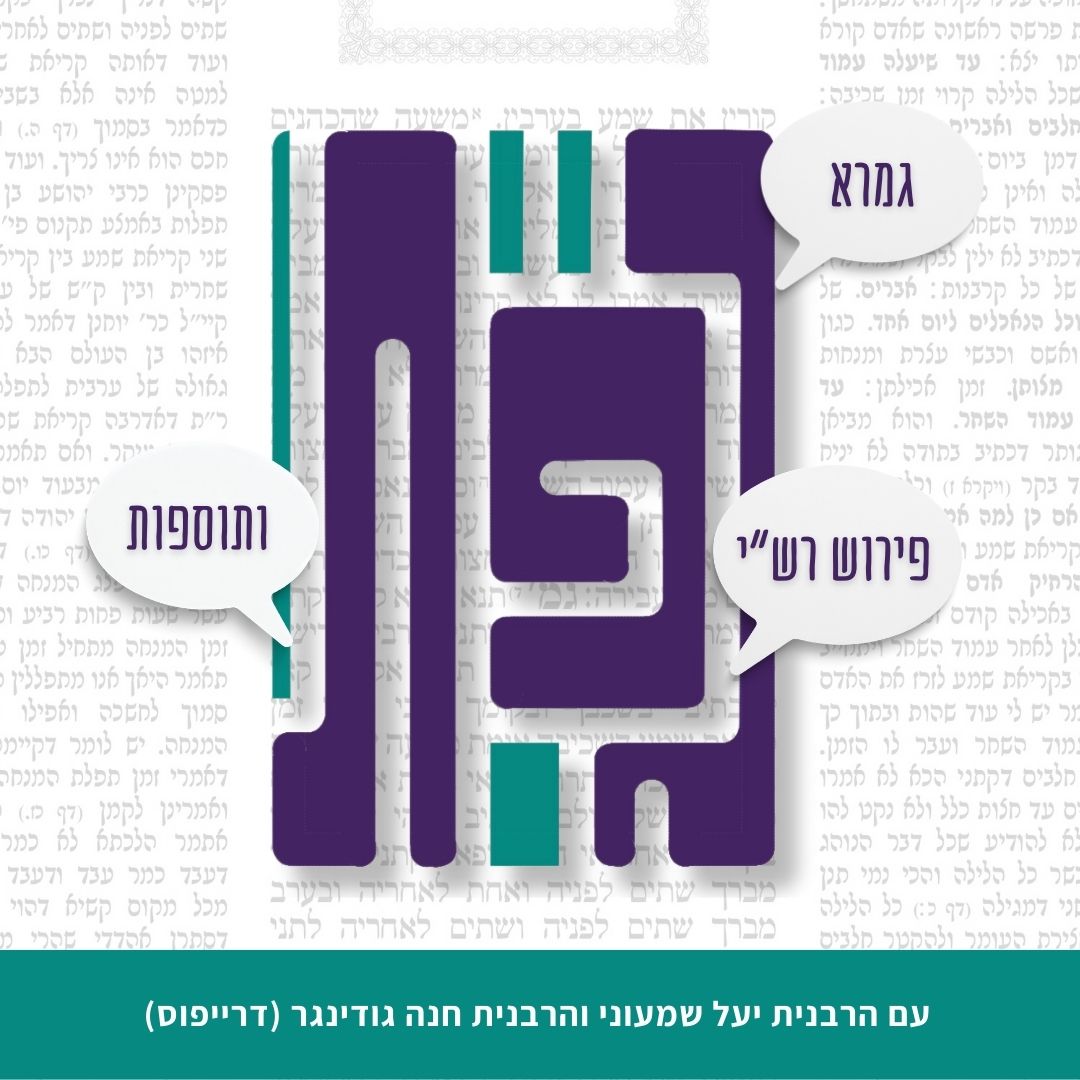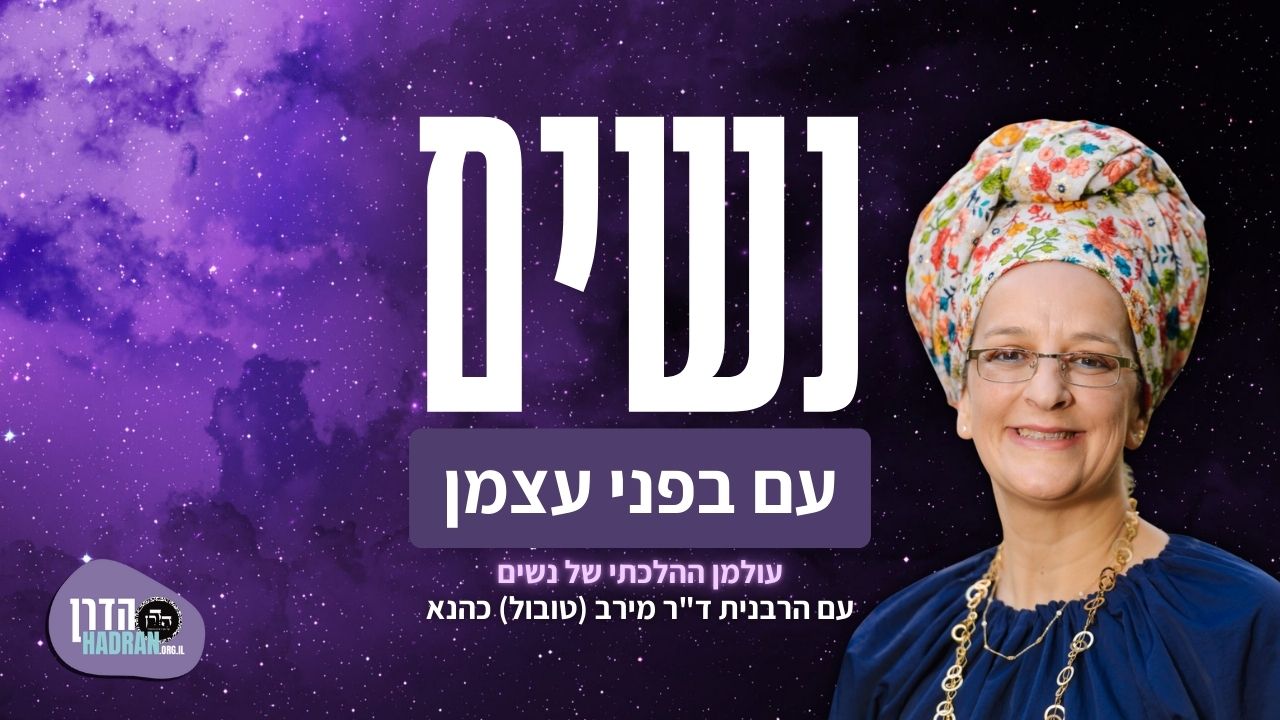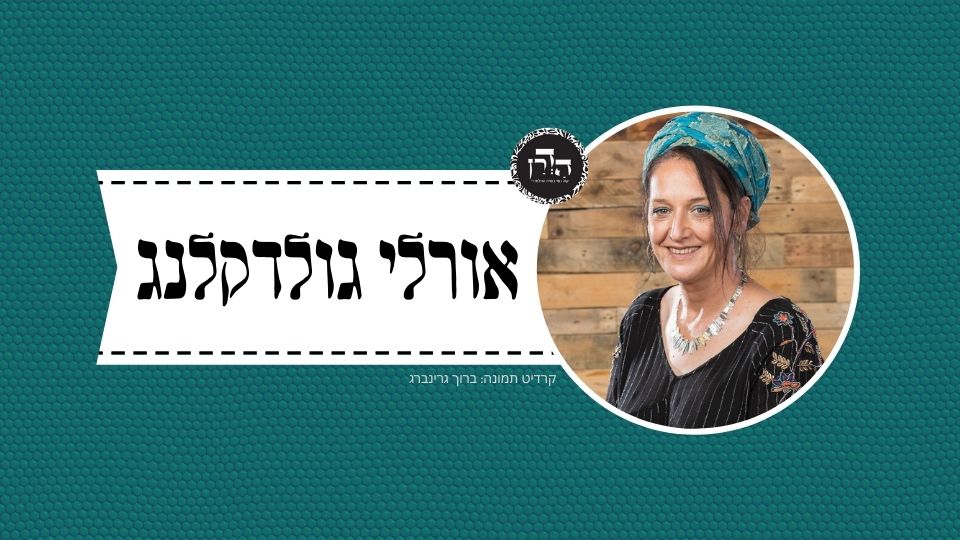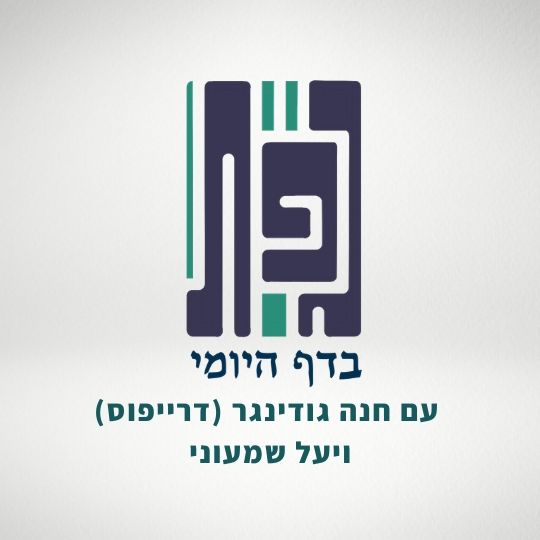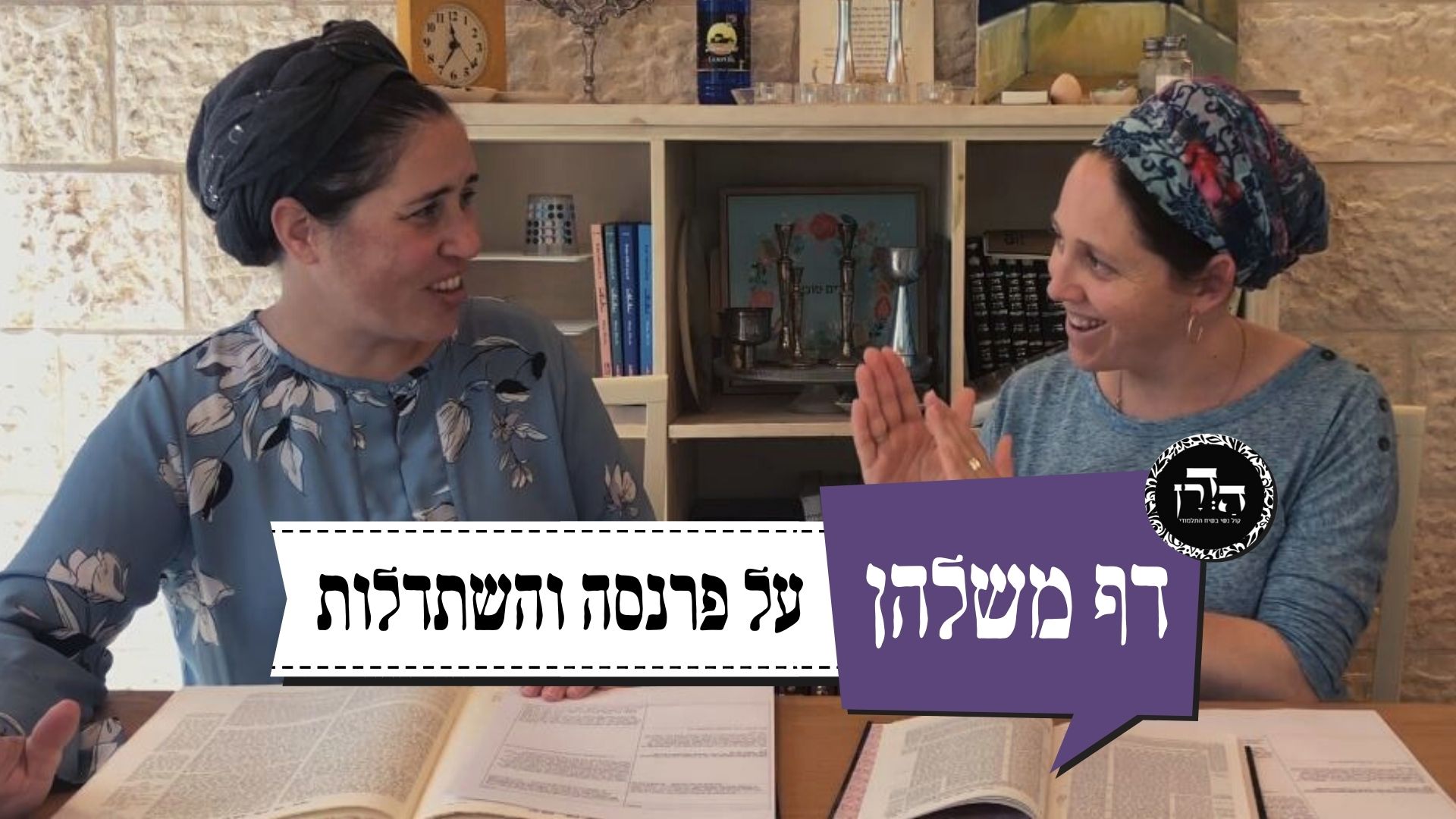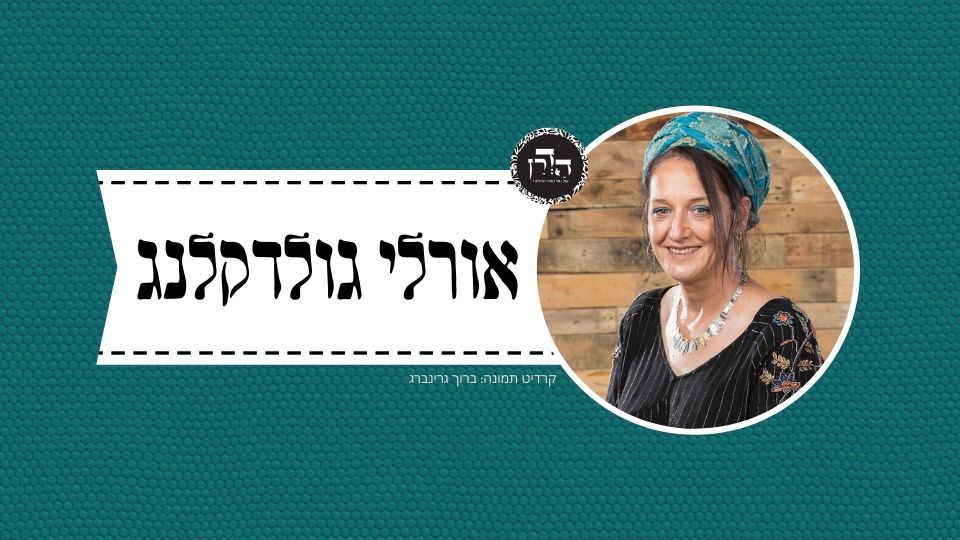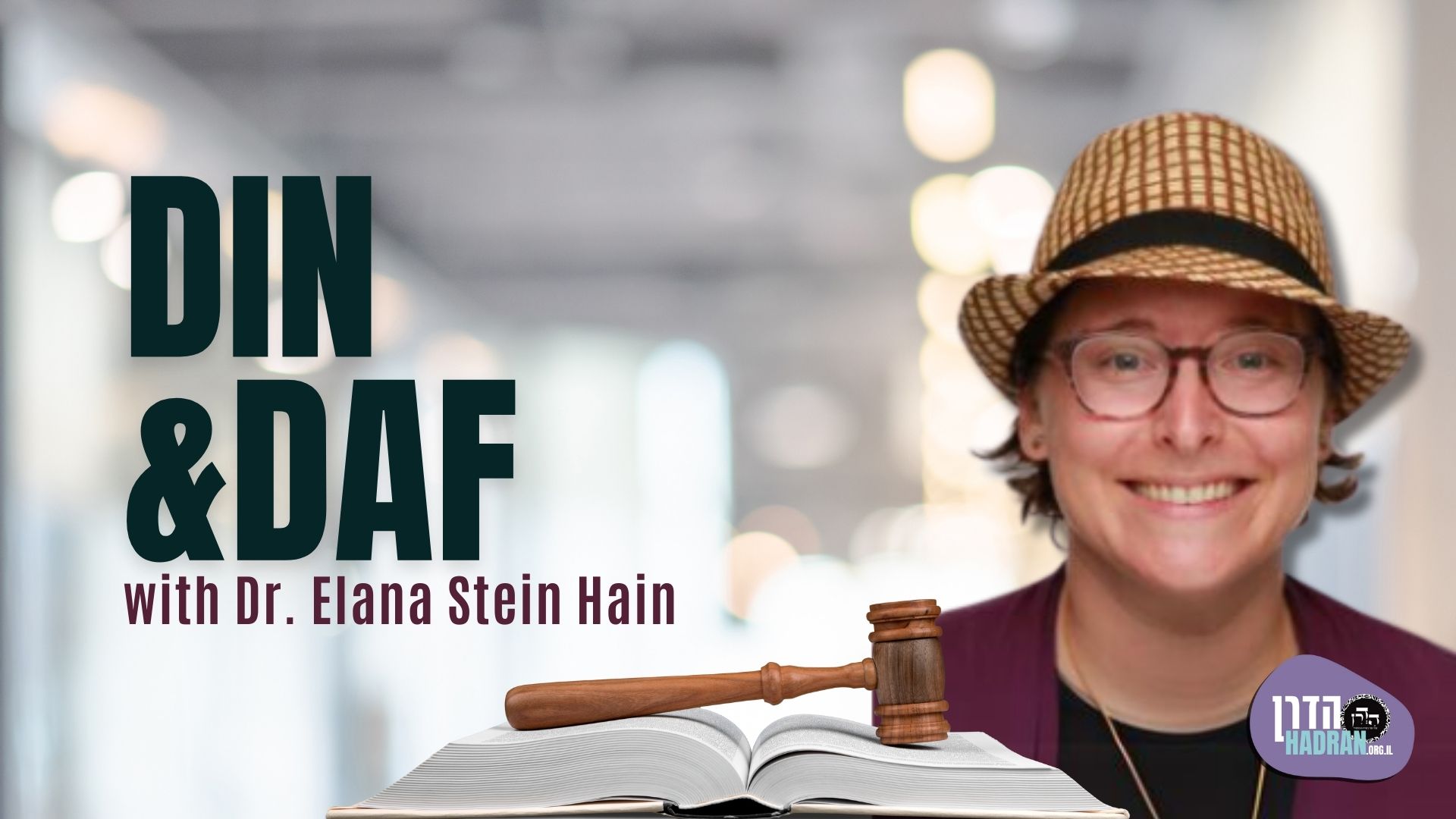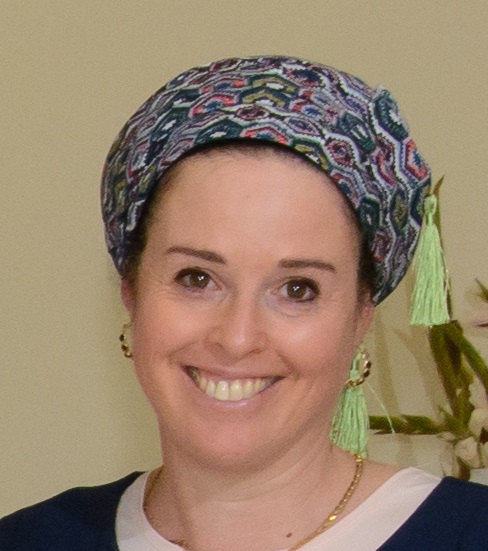אם הבן מת תוך שלושים יום וכבר שילמו לכהן, מה קורה? אם הבן מת אחר שלושים יום ולא שילמו לכהן ,האם עדיין יש חיוב על האב לשלם? האם אפשר לפדות בנו קודם שלושים יום? האם פדיון הבן נחשב דיני ממונות או דיני איסור והיתר או שניהם? אם יש חיוב על האב ועל הבן לפדות, את מי חייב האב לפדות אם אין לו כסף לשניהם? איך מעריכים את הסכום חמש סלעים – לפי איזה מטבע?
הלימוד השבוע מוקדש לזכות ולשלום הַיְימׇנוֹט אֱמוּנָה בַּת באנצ’י (קָסָאוּ) בת 11 שנעלמה במקום מגוריה בצפת, לפני שנתיים, ביום ט”ז אדר תשפ”ד (25.2.24), ולא נודעו עקבותיה.
רוצה להקדיש שיעור?

כלים
הלימוד השבוע מוקדש לזכות ולשלום הַיְימׇנוֹט אֱמוּנָה בַּת באנצ’י (קָסָאוּ) בת 11 שנעלמה במקום מגוריה בצפת, לפני שנתיים, ביום ט”ז אדר תשפ”ד (25.2.24), ולא נודעו עקבותיה.
כלים
העמקה
רוצה להבין מה באמת קורה מתחת לפני השטח של הסוגיה?
שיעורים, פודקאסטים והרחבות של מיטב המורות שלנו יפתחו לך עוד זוויות וכיווני חשיבה.
חדשה בלימוד הגמרא?
זה הדף הראשון שלך? איזו התרגשות עצומה! יש לנו בדיוק את התכנים והכלים שיעזרו לך לעשות את הצעדים הראשונים ללמידה בקצב וברמה שלך, כך תוכלי להרגיש בנוח גם בתוך הסוגיות המורכבות ומאתגרות.
פסיפס הלומדות שלנו
גלי את קהילת הלומדות שלנו, מגוון נשים, רקעים וסיפורים. כולן חלק מתנועה ומסע מרגש ועוצמתי.
בכורות מט
בְּבָא בְּהַרְשָׁאָה.
This is referring to a case where one of the fathers comes with authorization to act on behalf of the other father to state his claim for him, and therefore the priest cannot reject his claim. But if they gave the money to two different priests an authorization is of no effect, as each priest can claim the other took the redemption money of the son who died.
וְהָאָמְרִי נְהַרְדָּעֵי: לָא כָּתְבִינַן אַדְרַכְתָּא אַמִּטַּלְטְלִי! הָנֵי מִילֵּי הֵיכָא דְּכַפְרֵיהּ, אֲבָל הֵיכָא דְּלָא כַּפְרֵיהּ — כָּתְבִינַן.
The Gemara asks: But didn’t the Sages of Neharde’a say: We do not write an authorization document [adrakhta] concerning movable property? Therefore, in the case of redemption, where money, which has the status of movable property, is demanded from the priest, an authorization document may not be used. The Gemara answers: This statement, that one does not write authorization for movable property, applies only when the respondent, in this case the priest, already denied the claim against him. But in a case where the respondent did not yet deny the claim against him we write authorization even for movable property. In the case of redemption, although the priest claims the one issuing the claim against him is not the father of the son who died, he does not deny that he received the money.
זָכָר וּנְקֵבָה — אֵין כָּאן לַכֹּהֵן כְּלוּם. תָּנָא רַב הוּנָא: שְׁנֵי זְכָרִים וּנְקֵבָה — אֵין כָּאן לַכֹּהֵן כְּלוּם.
§ The mishna teaches: With regard to two women who had not previously given birth who were married to two men, and gave birth to a male and a female who then became intermingled, the fathers are exempt from the mitzva of redemption but the son is obligated to redeem himself, as he certainly has firstborn status. If the offspring were two females and a male, or two males and two females, all of whom became intermingled, the priest has nothing here. Concerning this case Rav Huna teaches: If they gave birth to two males and a female the priest has nothing here, despite the fact that one of them is definitely a firstborn, as each father can claim that his firstborn is the female. In addition, the sons are exempt as well, since each can claim that the female was his sister and born first.
וְתַנָּא דִּידַן, כֵּיוָן דְּבִשְׁנֵי אֲנָשִׁים הוּא דְּמַשְׁכַּחַתְּ לַהּ, בְּאִישׁ אֶחָד וּשְׁתֵּי נָשִׁים לָא מַשְׁכַּחַתְּ לַהּ — לָא מִתְּנֵי לֵיהּ.
The Gemara asks: And with regard to the tanna of our mishna, why does he not state this case? The Gemara answers: Since you find this ruling that they are entirely exempt in a case where the women are married to two men, but you do not find it in a case of one man and two of his wives, as a firstborn was definitely born to that man and he must give five sela coins to a priest, the tanna does not teach the case of two women and two men either. The reason is that stylistically, the tanna prefers to teach the ruling: The priest has nothing here, only when the halakha is identical in a case of two wives of two men and a case of two wives of one man.
מַתְנִי׳ מֵת הַבֵּן בְּתוֹךְ שְׁלֹשִׁים יוֹם, אַף עַל פִּי שֶׁנָּתַן לַכֹּהֵן — יַחְזִיר. לְאַחַר שְׁלֹשִׁים יוֹם, אַף עַל פִּי שֶׁלֹּא נָתַן — יִתֵּן. מֵת בְּיוֹם שְׁלֹשִׁים — כְּיוֹם שֶׁלְּפָנָיו. רַבִּי עֲקִיבָא אוֹמֵר: אִם נָתַן — לֹא יִטּוֹל, וְאִם לֹא נָתַן — לֹא יִתֵּן.
MISHNA: If the firstborn son dies within thirty days of birth, although the father gave five sela to the priest, the priest must return it. If the firstborn son dies after thirty days have passed, even if the father did not give five sela coins to the priest he must give it then. If the firstborn dies on the thirtieth day, that day’s halakhic status is like that of the day that preceded it, as the obligation takes effect only after thirty days have elapsed. Rabbi Akiva says: If the firstborn dies on the thirtieth day it is a case of uncertainty; therefore, if the father already gave the redemption payment to the priest he cannot take it back, but if he did not yet give payment he does not need to give it.
גְּמָ׳ מַאי טַעְמַיְיהוּ דְּרַבָּנַן? גָּמְרִי ״חֹדֶשׁ״ ״חֹדֶשׁ״ מִמִּדְבָּר, מָה הָתָם ״וָמַעְלָה״ אַף הָכָא נָמֵי וָמַעְלָה.
GEMARA: The Gemara asks: What is the reason of the Rabbis, i.e., the first tanna, who hold that the mitzva of redemption applies only after thirty days have elapsed? The Gemara explains that they derive the meaning of the term “month” stated in this context by means of a verbal analogy from the meaning of the term “month” stated in the context of the redemption of the Israelite firstborn in the wilderness via the Levites. Just as there, with regard to the redemption through the Levites, it is stated: “Number all the firstborn males of the children of Israel from a month old and upward” (Numbers 3:40), i.e., after thirty days, so too here, with regard to the mitzva of redemption for future generations, where it states: “From a month old you shall redeem” (Numbers 18:16), the requirement: And upward, applies as well, i.e., only after thirty days.
וְרַבִּי עֲקִיבָא מְסַפְּקָא לֵיהּ, מִדְּאִיצְטְרִיךְ לְמִכְתַּב ״וָמַעְלָה״ גַּבֵּי עֲרָכִין, וְלָא גָּמְרִי מִמִּדְבָּר — הָווּ לְהוּ שְׁנֵי כְּתוּבִים הַבָּאִים כְּאֶחָד,
And Rabbi Akiva is uncertain in this regard, as one could claim: From the fact that it was necessary for the verse to write “and upward” with regard to the mitzva of valuations: “And if it be from sixty years old and upward” (Leviticus 27:7), and it is not derived from the redemption of the Israelite firstborns in the wilderness that the phrase “from…years old” means “and upward,” one can conclude the following: The redemption of the firstborn in the wilderness and valuations are two verses that come as one, i.e., to teach the same matter.
וְכׇל שְׁנֵי כְּתוּבִים הַבָּאִים כְּאֶחָד — אֵין מְלַמְּדִין.
And there is a principle that any two verses that come as one do not teach their common halakha to other cases. If so, the halakha with regard to the mitzva of redeeming the firstborn for future generations would be that the thirtieth day is like the following day, which is not in accordance with the opinion of the Rabbis.
אוֹ דִלְמָא: כִּי אֵין מְלַמְּדִין — לְעָלְמָא, אֲבָל לְגוּפַיְיהוּ — מְלַמְּדִין, וּמִשּׁוּם הָכִי מְסַפְּקָא לֵיהּ.
Or perhaps one could say: When do two verses that come as one not teach their common halakha? That is with regard to general halakhot, i.e., entirely different areas of halakha. But with regard to themselves, i.e., similar cases, they do teach. If so, one should derive permanent halakha of redemption of firstborns from the redemption of the firstborn in the wilderness. And it is due to that reason that Rabbi Akiva is uncertain concerning a firstborn on his thirtieth day.
אָמַר רַב אָשֵׁי: הַכֹּל מוֹדִים לְעִנְיַן אֲבֵילוּת, יוֹם שְׁלֹשִׁים כְּיוֹם שֶׁלְּפָנָיו. וְאָמַר שְׁמוּאֵל: הֲלָכָה כְּדִבְרֵי הַמֵּיקֵל בְּאֵבֶל.
Rav Ashi says: All concede with regard to mourning that the thirtieth day is like the preceding day, i.e., if the son died on the thirtieth day it is considered as though he died on the day before and he has the status of a stillborn, and the rites of mourning are not observed. And the reason is as Shmuel says: The halakha is in accordance with the statement of the more lenient authority in matters relating to mourning.
מַתְנִי׳ מֵת הָאָב בְּתוֹךְ שְׁלֹשִׁים — בְּחֶזְקַת שֶׁלֹּא נִפְדָּה, עַד שֶׁיָּבִיא רְאָיָה שֶׁנִּפְדָּה; לְאַחַר שְׁלֹשִׁים יוֹם — בְּחֶזְקַת שֶׁנִּפְדָּה, עַד שֶׁיֹּאמְרוּ לוֹ שֶׁלֹּא נִפְדָּה. הוּא לִפְדּוֹת וּבְנוֹ לִפְדּוֹת — הוּא קוֹדֵם לִבְנוֹ; רַבִּי יְהוּדָה אוֹמֵר: בְּנוֹ קוֹדְמוֹ, שֶׁמִּצְוָתוֹ עַל אָבִיו וּמִצְוַת בְּנוֹ עָלָיו.
MISHNA: If the father of the firstborn dies within thirty days of birth the presumptive status of the son is that he was not redeemed, until the son will bring proof that he was redeemed. If the father dies after thirty days have passed the presumptive status of the son is that he was redeemed, until people will tell him that he was not redeemed. If one had both himself to redeem and his son to redeem, his own redemption takes precedence over that of his son. Rabbi Yehuda says: The redemption of his son takes precedence, as the mitzva to redeem the father is incumbent upon his own father, and the mitzva to redeem his son is incumbent upon him.
גְּמָ׳ אִיתְּמַר: הַפּוֹדֶה אֶת בְּנוֹ בְּתוֹךְ שְׁלֹשִׁים יוֹם, רַב אָמַר: בְּנוֹ פָּדוּי, וּשְׁמוּאֵל אָמַר: אֵין בְּנוֹ פָּדוּי. דְּכוּלֵּי עָלְמָא ״מֵעַכְשָׁיו״ — אֵין בְּנוֹ פָּדוּי, לְאַחַר שְׁלֹשִׁים יוֹם וְאִיתַנְהוּ לְמָעוֹת — וַדַּאי בְּנוֹ פָּדוּי.
GEMARA: It was stated: In the case of one who redeems his firstborn son within thirty days of his birth by giving a priest five sela coins, Rav says his son is redeemed and Shmuel says his son is not redeemed. The Gemara explains: Everyone agrees that if the father said: He is redeemed from now, that his son is not redeemed, as the obligation to redeem the son is not yet in effect. Likewise, if the father says the redemption should take effect after thirty days, and the money is still there, in the possession of the priest, after thirty days, his son is certainly redeemed, as the money is in the priest’s possession when the obligation of redemption comes into effect.
כִּי פְּלִיגִי לְאַחַר שְׁלֹשִׁים יוֹם, וְנִתְעַכְּלוּ הַמָּעוֹת, רַב אָמַר: בְּנוֹ פָּדוּי, מִידֵּי דְּהָוֵה אַקִּידּוּשֵׁי אִשָּׁה, הָתָם לָאו אַף עַל גַּב דְּנִתְעַכְּלוּ הַמָּעוֹת — הָווּ קִידּוּשֵׁי,
They disagree in a situation where the father says the redemption should take effect after thirty days but the money was squandered away in the meantime. Rav says his son is redeemed, just as is the halakha with regard to the betrothal of a woman on the condition that it takes effect after thirty days. In that case there, is it not correct that even though the money was squandered away during the thirty days it is a valid betrothal?
הָכָא נָמֵי לָא שְׁנָא.
Here, too, the halakha is no different.
וּשְׁמוּאֵל אָמַר לָךְ: הָתָם — בְּיָדוֹ לְקַדְּשָׁהּ מֵעַכְשָׁיו, הָכָא — אֵין בְּיָדוֹ לִפְדּוֹתוֹ מֵעַכְשָׁיו. וְאַף עַל גַּב דְּקַיְימָא לַן, דְּכֹל הֵיכָא דִּפְלִיגִי רַב וּשְׁמוּאֵל — הִלְכְתָא כְּרַב בְּאִיסּוּרֵי וְכִשְׁמוּאֵל בְּדִינֵי, הָכָא הִלְכְתָא כְּוָותֵיהּ דִּשְׁמוּאֵל.
And Shmuel could say to you: There, with regard to betrothal, it is in his power to betroth her from now, when he gave her the coins, and therefore it is irrelevant that the money was spent. Conversely, here, in the case of redemption, it is not in his power to redeem his son from now. With regard to the practical halakha in this dispute the Gemara comments: And even though we maintain as a principle that wherever Rav and Shmuel disagree the halakha is in accordance with the opinion of Rav in ritual matters and in accordance with the opinion of Shmuel in monetary matters, here the halakha is in accordance with the opinion of Shmuel, who holds that if one redeems his son within thirty days he is not redeemed.
תְּנַן: מֵת בְּתוֹךְ שְׁלֹשִׁים יוֹם, אַף עַל פִּי שֶׁנָּתַן לַכֹּהֵן — יַחְזִיר לוֹ חָמֵשׁ סְלָעִים. טַעְמָא דְּמֵת, הָא לֹא מֵת — בְּנוֹ פָּדוּי! הָכָא בְּמַאי עָסְקִינַן? דְּאִיתַנְהוּ לְמָעוֹת.
The Gemara raises a difficulty: We learned in the mishna on the previous amud: If the firstborn son dies within thirty days of birth, although the father gave five sela coins to the priest, the priest must return the five sela coins to him. The Gemara infers: The reason he must return the money is that the son died. But if he did not die within thirty days his son is redeemed despite the fact that the father gave the priest the money prior to the proper time. This inference contradicts the opinion of Shmuel. The Gemara answers: Here we are dealing with a case where the money is still extant, i.e., in the priest’s possession.
תָּא שְׁמַע: בְּחֶזְקַת שֶׁלֹּא נִפְדָּה עַד שֶׁיֹּאמְרוּ לוֹ שֶׁנִּפְדָּה! הָתָם נָמֵי דְּאִיתַנְהוּ לְמָעוֹת בְּעֵינַיְיהוּ.
The Gemara comments: Come and hear another difficulty from the mishna: If the father of the firstborn son dies within thirty days of the birth the presumptive status of the son is that he is not redeemed, until people will tell him that he is redeemed. But if people tell him he is redeemed then the redemption is effective, in contradiction to the opinion of Shmuel. The Gemara answers: There too, it is referring to a case where the money is still extant, i.e., in the priest’s possession.
תָּנֵי תַּנָּא קַמֵּיהּ דְּרַב יְהוּדָה: הַפּוֹדֶה אֶת בְּנוֹ בְּתוֹךְ שְׁלֹשִׁים יוֹם — בְּנוֹ פָּדוּי. אֲמַר לֵיהּ: שְׁמוּאֵל אָמַר אֵין בְּנוֹ פָּדוּי, וְאַתְּ אָמְרַתְּ בְּנוֹ פָּדוּי?! וְאַף עַל גַּב דְּקַיְימָא לַן כְּרַב בְּאִיסּוּרֵי וְכִשְׁמוּאֵל בְּדִינֵי, הָכָא הִלְכְתָא כְּוָתֵיהּ דִּשְׁמוּאֵל.
The Gemara relates that a tanna taught a baraita in the presence of Rav Yehuda: In the case of one who redeems his firstborn son within thirty days of his birth, his son is redeemed. Rav Yehuda said to him: Shmuel said his son is not redeemed, and yet you say his son is redeemed? The Gemara comments: And even though we maintain that the halakha is in accordance with the opinion of Rav in ritual matters and in accordance with the opinion of Shmuel in monetary matters, here the halakha is in accordance with the opinion of Shmuel.
הוּא לִפְדּוֹת וּבְנוֹ לִפְדּוֹת — הוּא קוֹדֵם לִבְנוֹ וְכוּ׳. תָּנוּ רַבָּנַן: הוּא לִפְדּוֹת וּבְנוֹ לִפְדּוֹת — הוּא קוֹדֵם לִבְנוֹ. רַבִּי יְהוּדָה אוֹמֵר: בְּנוֹ קוֹדְמוֹ, שֶׁמִּצְוָתוֹ עַל אָבִיו, וּמִצְוַת בְּנוֹ עָלָיו.
§ The mishna teaches that if one had both himself to redeem and his son to redeem, his own redemption takes precedence over that of his son. The Sages taught in a baraita: If one had both himself to redeem and his son to redeem, his own redemption takes precedence over that of his son. Rabbi Yehuda says: The redemption of his son takes precedence, as the mitzva to redeem the father is incumbent upon his own father, and the mitzva to redeem his son is incumbent upon him. Consequently, he should first fulfill the mitzva that is incumbent upon him by redeeming his son.
אָמַר רַבִּי יִרְמְיָה: הַכֹּל מוֹדִים הֵיכָא דְּלֵיכָּא אֶלָּא חָמֵשׁ סְלָעִים — הוּא קוֹדֵם לִבְנוֹ, מַאי טַעְמָא? דְּמִצְוָה דִּידֵיהּ עֲדִיף. כִּי פְּלִיגִי הֵיכָא דְּאִיכָּא חָמֵשׁ מְשׁוּעְבָּדוֹת וְחָמֵשׁ בְּנֵי חוֹרִין.
Rabbi Yirmeya says: Everyone concedes that in a case where there are only five sela coins available and one has to redeem both himself and his son, his own redemption takes precedence over that of his son, despite the indication to the contrary from the mishna. What is the reason? The reason is that his own mitzva is preferable to one he performs on behalf of others. Where they disagree is in a case where there is both land worth five sela coins that is liened property that had been previously sold to others and land worth five sela coins that is unsold property.
רַבִּי יְהוּדָה סָבַר: מִלְוָה הַכְּתוּבָה בַּתּוֹרָה — כִּכְתוּבָה בִּשְׁטָר דָּמְיָא, וְדִידֵיהּ אָזֵיל וְטָרֵיף מִמְּשַׁעְבְּדִי, וּבְהָנֵי חָמֵשׁ בְּנֵי חוֹרִין — פָּרֵיק לֵיהּ לִבְרֵיהּ.
The Gemara explains the reasoning behind the dispute: Rabbi Yehuda maintains that a loan that is written in the Torah, i.e., a financial obligation by Torah law, such as redemption of the firstborn son with five sela coins, is considered as though it is written in a document, and it can therefore be collected from liened property, as can any loan recorded in a document. Therefore, the five sela coins that are liened property are available for one’s own redemption but not for that of one’s son, as the sale of the property presumably occurred before the birth of his firstborn. And therefore the priest goes and repossesses the land worth five sela that is liened property for his own redemption, like any debt written in a document; and with those five sela of unsold property he redeems his son. In this manner, one can fulfill both mitzvot.
וְרַבָּנַן סָבְרִי: מִלְוָה הַכְּתוּבָה בַּתּוֹרָה — לָאו כִּכְתוּבָה בִּשְׁטָר דָּמְיָא, הִלְכָּךְ מִצְוָה דִּידֵיהּ עָדִיף.
And the Rabbis maintain: A loan that is written in the Torah is not considered as though it is written in a document, since buyers will not know to guard against repossession if it is not written in a document. Therefore, the five sela coins that are liened property are not available for redemption, and consequently his own mitzva is preferable. He accordingly redeems himself with the land that is not liened.
מַתְנִי׳ חָמֵשׁ סְלָעִים שֶׁל בֵּן — בְּמָנֶה צוֹרִי.
MISHNA: The five sela coins of the redemption of the firstborn son, with regard to which it is written: “Five shekels of silver, after the shekel of the Sanctuary” (Numbers 18:16), are calculated using a Tyrian maneh. The silver content of the Tyrian coinage is significantly higher than that of provincial coinage, which is worth one-eighth its value.
שְׁלֹשִׁים שֶׁל עֶבֶד, חֲמִשִּׁים שֶׁל אוֹנֵס וְשֶׁל מְפַתֶּה, וּמֵאָה שֶׁל מוֹצִיא שֵׁם רַע — כּוּלָּם בְּשֶׁקֶל הַקֹּדֶשׁ, בְּמָנֶה צוֹרִי. וְכוּלָּן נִפְדִּין בְּכֶסֶף וּבְשָׁוֵה כֶּסֶף, חוּץ מִשְּׁקָלִים.
With regard to the thirty shekels paid to the owner of a Canaanite slave who is killed by an ox (see Exodus 21:32), and the fifty shekels paid by a rapist (see Deuteronomy 22:29) and by a seducer (see Exodus 22:16) of a young virgin woman, and the one hundred shekels paid by the defamer of his bride with the claim that she is not a virgin (see Deuteronomy 22:19), all of them, even those cases where the word shekel is not explicitly written, are paid in the shekel of the Sanctuary, whose value is twenty gera (see Numbers 18:16) and that is calculated using a Tyrian maneh. And all monetary obligations are redeemed, i.e., paid, with coins or with items of the equivalent value of money, except for the half-shekels that are donated to the Temple each year, which must be given specifically as coins.
גְּמָ׳ מָנֶה צוֹרִי. אָמַר רַבִּי אַסִּי: מָנֶה שֶׁל צוֹר. רַבִּי אַמֵּי אָמַר: דִּינָרָא (ערבא) [עַרְבָיָא]. רַבִּי חֲנִינָא אוֹמֵר: אִיסְתֵּרָא סֻרְסְיָא דְּמִיזְדַּבְּנָא תְּמָנְיָא בְּדִינָרָא, חֲמֵשׁ מִינַּיְיהוּ לְפִדְיוֹן הַבֵּן.
GEMARA: The mishna stated that the five sela coins of the redemption of the son are calculated using a Tyrian maneh. In explanation of this, Rabbi Asi says: One must give five sela of the maneh used in Tyre. Rabbi Ami says: The five sela coins are equal to a golden Arabian dinar. Rabbi Ḥanina says: There is a Syrian sela [istera], eight of which are sold for a large golden dinar. One must give five of these for the redemption of the son.
